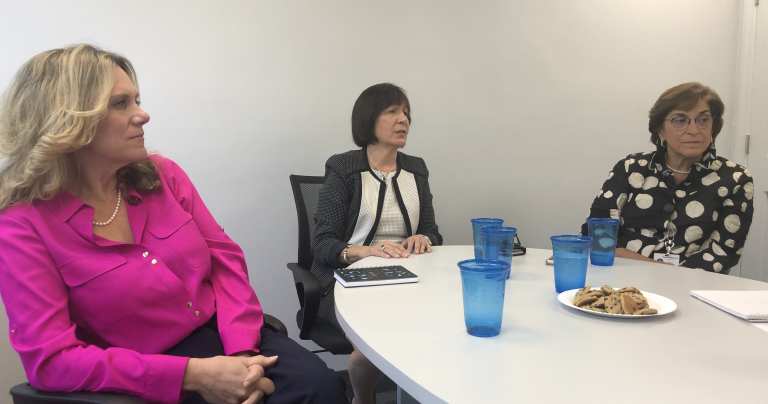
Experts in elder care say that planning is key to a financially viable retirement in an era where seniors are living longer.
Connie Wasserman, associate executive director of the Sid Jacobson Jewish Community Center in East Hills, said at a roundtable discussion hosted by Blank Slate Media that seniors’ needs have changed in the years since their own parents retired.
“When we look at the senior population, it looks very different than it did for our parents,” Wasserman said. “Those of us that are in our 60s and 70s are not necessarily doing the same thing that the previous generation did.”
Wasserman also said that seniors tend to be thought of as “one lump group,” when they actually range in age and needs.
“When we look at teens, we look at them as pre-teens, teens and young adults,” Wassermann said. “We need to start looking at seniors in the same way. There’s the younger senior, the middle stage senior and the latter stage senior.”
Also present at the roundtable was Wendy K. Goidel, founder of the Melville-based Goidel Law Group. Goidel, whose firm specializes in estate planning and elder law, says it is imperative to tailor latter-year care to an individual’s needs.
“What’s right for one individual isn’t necessarily right for another,” she said.
Further, Goidel says, it is crucial to plan in advance in order to arrange one’s desires for care, which will prove to be a time and frustration saver later on.
“Preplanning is critical because then you have many more options for how to plan the care, there’s much less stress, tension, frustration on the part of the individual and the family remembers when planning is done proactively,” Goidel said.
Being realistic with expectations for care is also important, says Goidel.
“You need to talk about what your worst day looks like and you need to be very specific,” Goidel said. “This is not the time in your life to be proud. You need to put on the table exactly what’s going on, because that’s the only way to make sure that you’re going to get the requisite hours of care you need.”
Options for care depend on the individual, Goidel said, and can range from living with adult children while attending a senior day program to residing in assisted living communities and beyond.
Maureen Scalesi is vice president of health care at Ultimate Care Assisted Living Management, which manages the Bristal chain of assisted living facilities.
“What assisted living does is provide another option; less clinical, more homelike,” Scalesi said. “At the Bristals, it’s apartments. People have their own apartment, a little kitchenette, a bathroom.”
The Bristals also provide meals, housekeeping, activities in order for residents to socialize, and care for those who require it, Scalesi says.
“If someone needs care, we can help them with their activities of daily living, meaning dressing, bathing, grooming,” Scalesi said. “We can assist them with making appointments, we have doctors who come into the buildings to see the residents there, so they don’t have to go out, the services are brought to them.”
Wasserman, a 21-year JCC veteran who created the center’s day program for seniors, described the program’s goal as allowing seniors to “age in place.”
“Our senior services center provides programs like lecture series, discussion groups, exercise, swimming, whatever for a vibrant senior, and it’s a safety net so that they can age in place and we can provide them with any more services as needed,” Wasserman said.
Participants in the JCC’s program range in age from 60 to 90 or more, who come while still residing at home or in the home of an adult child. For Scalesi, average entry age for Bristal residents has risen as seniors choose to stay at home as long as possible.
“Over the last couple of years, the ages of the residents coming in has definitely been higher than it used to be, so people are staying home longer, with the services at home longer and coming to the assisted living at a later age, so the average age is more toward the late 80s, whereas it had been in the earlier 80s years ago,” Scalesi said.
Such trends make it all the more important to plan ahead, says Goidel, for the sake of the senior and the family.
“It makes things so much easier for loved ones when the eventual crisis does occur, and now the plan is in place and can be implemented and the instructions that that person needing the care put into place can be easily followed, so the family members have the instructions, they’re not left floundering, trying to figure out what their loved one would want to do, and there’s much more that can be protected in a situation such as that,” Goidel said.






